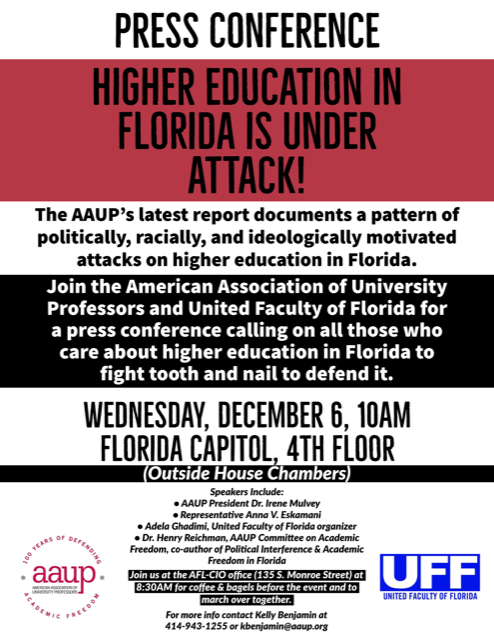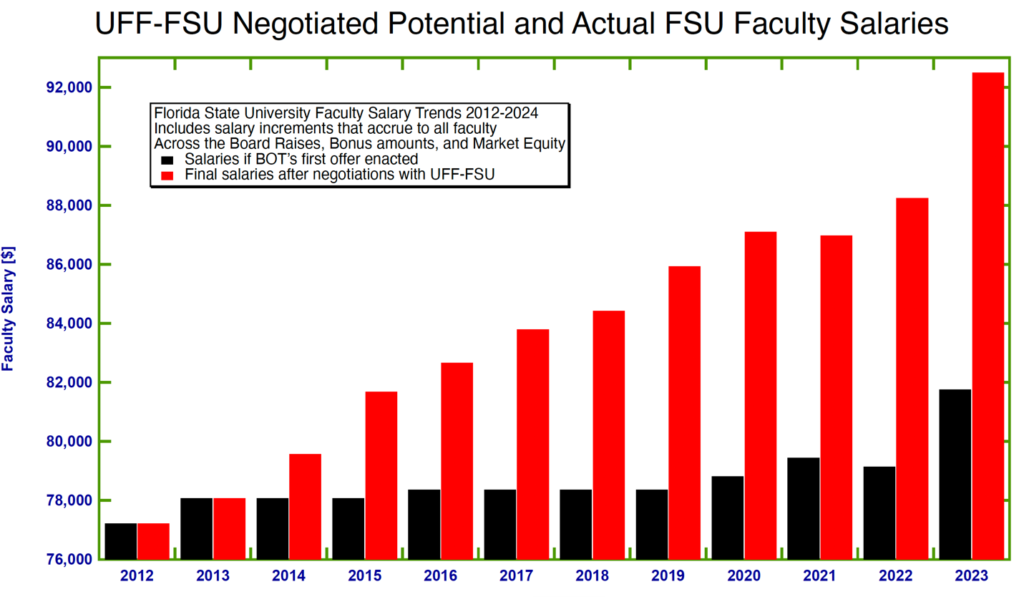
Wednesday, Dec 6, 2023: 10AM AAUP Event



The bargaining team regularly writes you with bargaining updates. This email is different.
Unless more faculty members join, our union could be decertified early in the new year.
We have years of experience negotiating the Collective Bargaining Agreement, and we know what is in store for faculty if the union is decertified and the CBA is dead. We know because the FSU Board of Trustees fights for the same wish list year after year: They seek to shorten the length of contracts for Specialized Faculty, and every year we put the kibosh on it. They seek to shuffle a high proportion of salary increase dollars into a pot solely administered by deans, and every year we redirect much of it to all faculty or to faculty whose peers evaluated their merit.
Those almost-guaranteed changes are the tip of the iceberg.
The CBA comprises 31 articles and 11 appendices that the UFF and the Board of Trustees (BOT) have agreed to, and all of them will disappear. In their place, the Governor-appointed BOT will unilaterally determine promotion criteria, the rank order of faculty in a layoff, grievance rights, the content allowable in performance evaluation folders, the extent of academic freedom, and a couple dozen other policies, procedures, and rights.
We are your bargaining team, holding decades of experience in negotiations, and we know what the future without a faculty voice would look like. Don’t let it happen. We need 80 more faculty members to join and the 95 former members who missed the eDues deadline to re-join our union.
Join now. Here’s the link to join or re-join: Tomorrow is too late.
All the best,
Your UFF-FSU Bargaining Team
Brian Arsenault
Michael Buchler
Arash Fahim
Jack Fiorito
Robin Goodman
Scott Hannahs
Matthew Lata
Jennifer Proffitt
Dear FSU Colleagues:
The Board of Trustees (BOT) and UFF faculty (UFF) bargaining teams met Wednesday (11/8) to continue their negotiations on Post-Tenure Review (PTR). The session started with a new proposal from UFF designed to make the PTR more faculty friendly, including the following:
After a caucus, the BOT team offered a counter-proposal including the following:
In sum, there was some progress, but there is more work needed. Negotiations are scheduled to resume in early December.
In the meantime, if you are not already a UFF member in good standing (paying dues via eDues), we hope you’ll join or rejoin our faculty union and help protect the very existence of our contract. If we don’t reach 60% membership density, we simply won’t have a contract to defend. Please join now. It only takes a minute. Here’s the link: https://uff-fsu.org/get-involved/join/
Jack Fiorito, UFF-FSU Vice President and Bargaining Team Member, on behalf of
Scott Hannahs, Specialized Faculty, and Jennifer Proffitt, Professor, Bargaining Team Co-Chairs
Dear FSU Colleagues,
The UFF and BOT teams met Wednesday, October 25th, to discuss the latest BOT counter-offer on the memorandum of agreement (MOA) about the Post-Tenure Review (PTR) process. The UFF-FSU team started the meeting by clarifying that both teams agree on the importance of tenure for academic freedom and for the reputation of the university. The UFF-FSU bargaining team then asked questions to clarify some parts of the counter-offer, especially the changes proposed by the UFF-FSU bargaining team which were struck by the BOT team. Discussion involved the following questions and concerns.
All the best,
Arash Fahim, Bargaining Team Member, on behalf of
Scott Hannahs, Specialized Faculty, Magnet Lab, and Jennifer Proffitt, Professor, Communication
Co-Chief Negotiators, UFF-FSU